David Dubrow's Blog, page 3
February 19, 2020
Attack from Planet B Movie Review: Mafia Women 2
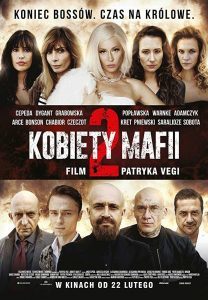 I wrapped up my three-fer of reviewing Patryk Vega movies with Mafia Women 2 at Attack from Planet B:
I wrapped up my three-fer of reviewing Patryk Vega movies with Mafia Women 2 at Attack from Planet B:
Olga Boladz, who played the protagonist from the first film, probably didn’t want to have her name attached to this monstrosity because her character was murdered, off-camera, in the first minute of Women of Mafia 2. Says rather a lot, doesn’t it. Other surviving characters from Mafia Women, however, do continue their stories here, even if they don’t intersect or affect each other. The overarching plot, such as it is, involves a drug deal between Nanny’s drug gang and a Colombian cartel that goes terribly wrong, and the fallout that results from it.
I really need you to click to read the whole review to make me feel better about watching this film. Please.






February 14, 2020
Movie Review Resurrection: Killbillies
(When the much-missed horror site The Slaughtered Bird closed its doors some time ago, a number of my movie reviews fell into limbo. As some of the reviews are worth retrieving from that dark and empty place, I am posting my review of Killbillies here. I don’t hate all B-movies. Just the really bad ones.)
Killbillies is touted as the first horror film to come out of Slovenia, which makes it historical, after a fashion. I didn’t know where Slovenia was before I looked it up (I mean, I knew it was in Europe somewhere). To save you a Google search, just imagine a small, irregular splotch just to the right of the top of Italy’s boot, and there you are: Slovenia. Judging from the movie’s cinematography, Slovenia is a beautiful, wooded place with mountains and valleys and a nightmarishly dark urban center where you’re as likely to be served distilled cerebrospinal fluid in the dive bars as you are a refreshing Slovenian beer. (I don’t know if the latter exists, but I imagine it does.)
 The title says it all, and that’s where this movie shines. It doesn’t pretend to be anything other than an homage to films like The Texas Chainsaw Massacre and Deliverance. The plot is admirably uncomplicated: a pair of beautiful models, their photographer, and a makeup artist go into the wilderness to take pictures; they meet up with some seriously inbred primitives; death and horror ensue. You don’t go to see a film like Killbillies for the existential angst.
The title says it all, and that’s where this movie shines. It doesn’t pretend to be anything other than an homage to films like The Texas Chainsaw Massacre and Deliverance. The plot is admirably uncomplicated: a pair of beautiful models, their photographer, and a makeup artist go into the wilderness to take pictures; they meet up with some seriously inbred primitives; death and horror ensue. You don’t go to see a film like Killbillies for the existential angst.
If that isn’t enough reason for you to run, not walk to the nearest Killbillies-purveying establishment and put your fat fingers on a copy right away, here’s another: it’s a hell of a lot of fun to watch. The style of filming brings a freshness to the subject matter that goes beyond the expected blood, gore, and shrieks. Screenwriter Tomaz Gorkic makes us care about what happens to these poor victims, despite how unlikable most of them are, and once the real terror stops, it doesn’t let up until the closing scene.
The two heavies, Francl and Vintlr, are entertainingly vile. Vintlr is particularly disgusting, with his horrible teeth and drool and overall demeanor, while Francl’s facial deformity, with its peeling scabs and bloodshot eye, makes one want to turn away whenever he’s on screen. Putting Francl in lederhosen was an inspired choice, adding a soupcon of black humor to his lumpish, menacing figure.
Don’t expect boobs, because you won’t see any. You will see a lot of blood from a number of lens-splattering gore effects, which is great because the breathtaking outdoor scenes can only carry the film so far.
So what are you waiting for? Do you really want to pass up the opportunity to see the first Slovenian horror film? Francl’s waiting, after all, and his rusty old axe is pretty thirsty.






February 4, 2020
Interview With Denise McAllister
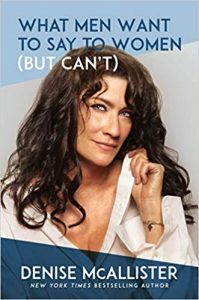 At Hollywood in Toto, I interviewed Denise McAllister, author of What Men Want to Say to Women (But Can’t):
At Hollywood in Toto, I interviewed Denise McAllister, author of What Men Want to Say to Women (But Can’t):
Why can’t men say certain things to women? What’s keeping them from saying what they want to say?
DM: Because of the politically correct culture we live in, many people are afraid or simply can’t say—due to professional concerns (as well as relational)—what they want to say about protected topics such as those about women. If a man is honest about how women lie about rape, for example, he’s called a misogynist. If he says women need to stop whining about equal pay for equal work when they’re not really doing equal work, then he’s labeled a sexist. If he says that women need to understand that men are visual creatures and appreciating a woman’s sex appeal and feminine beauty—even pointing it out “among the guys”—isn’t sexist, he’ll still be called a misogynist. If you say that fathers are needed in the home, then you’re treated as if you’re somehow denigrating moms. Because of the labels attached to these comments, men are silenced and controlled by the feminist agenda.
She’s got a lot to say, and it’s all fascinating. Check it out!






January 31, 2020
K-Drama Rundown at HiT
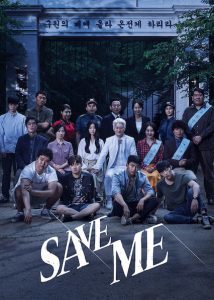 I have a piece up at Hollywood in Toto, offering binge-worthy Korean television series as an alternative to Hollywood:
I have a piece up at Hollywood in Toto, offering binge-worthy Korean television series as an alternative to Hollywood:
To misquote Mark Twain, “Everybody complains about Hollywood, but nobody does anything about it.” From the bloated, ossified franchises kept alive by Boomer and Gen-X nostalgia dollars (hello, Marvel/Star Wars) to woke studios that produce unwatchable tripe in service to progressive social engineering (hello, anything that’s won a televised award in the last ten years), Tinseltown, for many of us, is no longer a viable source of entertainment. And yet we, as Americans, have more leisure time than ever before, and we like to watch things on screens.
So what do we do about it? Where do we go?
Try South Korea.
Click to get the rundown on the best K-dramas available on Netflix!






January 23, 2020
What’s for Dinner? Two Book Reviews
Several months ago, accomplished writer Kristin Devine, who wrote a blurb for Appalling Stories, recommended a book to me by Michael Pollan called The Omnivore’s Dilemma: A Natural History of Four Meals. Written in 2006, it asked the question What should we have for dinner? in a way that explores food choices, nutrition, survival, taste, farming, and ethics, among many other issues. It’s a tremendously entertaining book, and the universality of its themes keep it relevant fourteen years after its original publication.
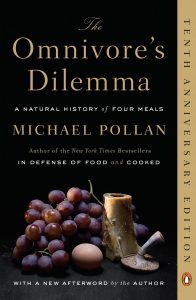 As with all non-fiction books, I did what most of us do: I unquestioningly accepted those premises that reinforced my already-held opinions, rejected those that I found entirely antithetical to my worldview, and hoped that I would learn something somewhere in the middle. Pleasantly, as this is a mostly apolitical book, I found a great deal to learn from and enjoy, and it opened my eyes to issues that I had opinions on, but hadn’t considered very deeply. So The Omnivore’s Dilemma is an unqualified success. I learned something. And, more importantly, it’s influenced me to make some different choices: namely, what’s for dinner.
As with all non-fiction books, I did what most of us do: I unquestioningly accepted those premises that reinforced my already-held opinions, rejected those that I found entirely antithetical to my worldview, and hoped that I would learn something somewhere in the middle. Pleasantly, as this is a mostly apolitical book, I found a great deal to learn from and enjoy, and it opened my eyes to issues that I had opinions on, but hadn’t considered very deeply. So The Omnivore’s Dilemma is an unqualified success. I learned something. And, more importantly, it’s influenced me to make some different choices: namely, what’s for dinner.
Civilization means taming, as much as we can, the somewhat arbitrary nature of the universe. We build houses and install central heating because the weather’s not always warm and pleasant. We develop language and communication skills because everybody else has different feelings and desires from us. And we preserve food because nourishment doesn’t just drop from the sky like the Israelites’ manna. In something as seemingly straightforward as farming, for example, there are many complicating factors: disease, weather, economics, and expanding human populations to feed. So we tried to solve these problems using artificial fertilizers, chemical pesticides, monoculture farming (corn), breeding crops for desirable characteristics, and so on. The end result of these solutions is that we’re all better fed, but we’re not all healthier. There’s a widening gap between being fed and being nourished, and we see that in rising rates of obesity and other health concerns that are, unfortunately, somewhat self-inflicted. So what do we do?
Pollan doesn’t offer many solutions, but that’s deliberate: he does the journalist’s trick of leading you to the point of view he wants you to adopt with the way he presents the information. It worked for me, in some limited fashion. We’ll see if it has any long-term effects on my health.
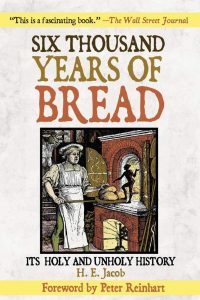 One change we’re making at our house is substituting whole grains for some of the white flour we eat, particularly in bread. (As nobody’s succeeded in making a whole wheat pasta that tastes good, we’re sticking with the standard stuff, however.) My favorite hobby is baking bread, so I went back to texts like Peter Reinhart’s Whole Grain Breads and Artisan Breads Every Day to develop my skills in the whole wheat realm. In the bibliography of ABED Reinhart mentioned a seminal book called Six Thousand Years of Bread: Its Holy and Unholy History. Published in 1944 by H.E. Jacob, a German Jew who was imprisoned in both Dachau and Buchenwald, the book’s title says it all.
One change we’re making at our house is substituting whole grains for some of the white flour we eat, particularly in bread. (As nobody’s succeeded in making a whole wheat pasta that tastes good, we’re sticking with the standard stuff, however.) My favorite hobby is baking bread, so I went back to texts like Peter Reinhart’s Whole Grain Breads and Artisan Breads Every Day to develop my skills in the whole wheat realm. In the bibliography of ABED Reinhart mentioned a seminal book called Six Thousand Years of Bread: Its Holy and Unholy History. Published in 1944 by H.E. Jacob, a German Jew who was imprisoned in both Dachau and Buchenwald, the book’s title says it all.
It would be wrong, however, to describe the book as a history of bread; it’s actually a history of mankind’s relationship with bread, starting from prehistory and ending with the advent of World War Two. Jacob describes every facet of this relationship, from grain types to farm implements, religious rites to cultural customs, and famine to war. His airy, storytelling style keeps it from being a dry recitation of events, and instead narrates the love affair with wheat we humans have engaged in for millennia. You’ll learn why both the miller and the baker have been so reviled throughout history, the secrets behind food riots in France and Germany, and how America fed the Allied forces in World War I, among many other things. It’s lengthy and detailed, but if you want the inside story on such a universal, foundational food, Six Thousand Years of Bread is a must-read.
Bon appétit!






January 14, 2020
Attack from Planet B Review: Mafia Women
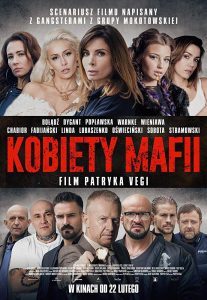 Who doesn’t like mob movies? Not me. That is, I do like them. Yes. I hope I’ve made myself clear. Anyway, I reviewed the Polish mob movie Mafia Women for Attack from Planet B:
Who doesn’t like mob movies? Not me. That is, I do like them. Yes. I hope I’ve made myself clear. Anyway, I reviewed the Polish mob movie Mafia Women for Attack from Planet B:
Several of [writer-director Patryk] Vega’s characters were lifted without attribution from older, better intellectual properties. The bald police captain has a Kojak-like penchant for eating lollipops. The mafia boss is given to experiencing Tony Soprano-style panic attacks. The boss’s teenage daughter is the worst singer in Warsaw, but everyone applauds her cat-strangling efforts. Et cetera. Basically, law enforcement and crime families in Poland are the same as American cops and goons, except the Poles eat pierogi and the Americans eat pizza.
Oh, but does it coalesce into a delicious kielbasa stew, or is it as bad as Vega’s Botoks? Only one way to find out, and that’s by clicking!






January 8, 2020
Book Review: Ten Arguments for Deleting Your Social Media Accounts Right Now
When Jaron Lanier’s book Ten Arguments for Deleting Your Social Media Accounts Right Now popped up on my Amazon feed, I had to have it. I’ve written extensively about the dangers and problems of social media, and I no longer look at Twitter or Facebook for a host of reasons. I have my site post to them, but I don’t look at the feed. In short, I had already formed my own arguments for deleting my social media accounts, so I figured it would be interesting to read what a Silicon Valley insider thought. And it always helps to backfill one’s already-assumed point of view with arguments in favor of it. Most of us do that anyway.
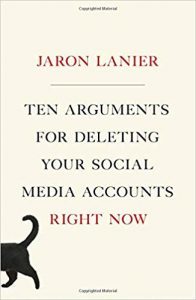 As it was, Lanier’s book was, for the most part, a disappointment.
As it was, Lanier’s book was, for the most part, a disappointment.
The writing style is folksy and conversational, which works fine for the subject matter. And I hadn’t considered some of the arguments Lanier put forth. However, there’s a strong political slant to the book that not only undercuts Lanier’s own arguments, but calls into question his analytical faculties in a way that makes the content questionable.
Lanier is obviously a progressive out of the Silicon Valley mold, which doesn’t disqualify him from writing any sort of book, but he refuses to accept responsibility for the progressive political slant of the social media companies he rails against. He claims, despite all evidence to the contrary, “Social media is biased, not to the Left or the Right, but downward.” The political right has always been the recipient of the vast majority of account deletions, shadowbanning, and social media deplatforming. The people who run these social media companies not only foster far-left political environments in their respective workplaces, they enforce their bizarre version of ethics on their users through Terms of Service that change wherever the political winds blow. When tweeting “Learn to code” to a left-wing journalist is a bannable offense, but calling a conservative person a Nazi is not, that’s a political issue. That’s bias.
The problem with the book is that Lanier can’t afford to admit that the left is culpable for turning social media into a disgusting sewer, because it would require him to turn the force of his analysis on himself, his cohorts, and the culture he helped shape, and who wants to dive into all that ugliness without a hazmat suit? The right shares some of the blame for the hostile social media culture we’ve developed, but when all the bannings and deplatformings go one way and not the other, it’s obvious that the people in charge enforce the rules selectively, to the detriment of social media in general.
When Lanier calls Congressperson Alexandria Ocasio-Cortez (D-NY), who famously claimed that the world would end in twelve years, an “optimistic young politician,” it’s a questionable claim, no matter how you feel about AOC’s politics. When he spends paragraphs boosting Black Lives Matter and attacking Trump for tweeting, it suggests that he has an axe to grind that goes way past the advice of deleting one’s social media accounts. What’s good for Lanier isn’t, perhaps, what’s good for you, particularly if you don’t share his fringe worldview.
In addition, the redundancy of some of the arguments he makes suggests that the number ten was selected for its aesthetic qualities, not because he had ten solid reasons. There’s quite a bit of argument overlap.
Reading Ten Arguments was very much like trying to eat lunch in a nice restaurant, but the waiter is overly attentive and suffers from horrible body odor. If Lanier’s progressive politics, born of unthinking Silicon Valley progressivism, don’t bother you, then you’ll appreciate the book more than I did.
Ultimately, all you need is one argument for deleting your social media accounts, and you probably know what it is already. Do you need a book to tell you what’s good for you?






December 31, 2019
2019: The Year in Review
What can you say about an entire year? Nothing terribly tragic or awful happened to me or my family in 2019, which I’m pretty happy about. If I didn’t have politics as a hobby I’d consider it a generally uneventful year in terms of world affairs.
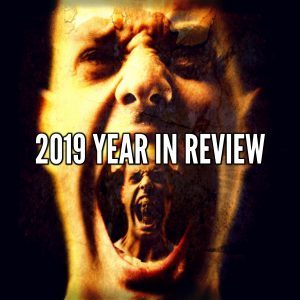 I released two books in 2019: Appalling Stories 3: Escape from Trumplandia, which is a satirical novella I co-wrote with Ray Zacek; and Appalling Stories 4: Even More Appalling Tales of Social Injustice, a short story anthology with several authors. Overall, I’m pleased with how they both came out. Trumplandia is a very funny book that skewers both sides of the political divide, though the left more strongly than the right. Appalling Stories 4 gave me the opportunity to work with a number of different writers and allowed me to expand the mythology of the Bee-pocalypse I wrote about in stories like The Bitterness of Honey and Dear Dad.
I released two books in 2019: Appalling Stories 3: Escape from Trumplandia, which is a satirical novella I co-wrote with Ray Zacek; and Appalling Stories 4: Even More Appalling Tales of Social Injustice, a short story anthology with several authors. Overall, I’m pleased with how they both came out. Trumplandia is a very funny book that skewers both sides of the political divide, though the left more strongly than the right. Appalling Stories 4 gave me the opportunity to work with a number of different writers and allowed me to expand the mythology of the Bee-pocalypse I wrote about in stories like The Bitterness of Honey and Dear Dad.
I also created the Chirper, a Twitter alternative exclusive only to this site. It’s on the sidebar. Check it daily.
I continue to work on the science fiction adventure series I mentioned in Another Bleeping Podcast. It’s taking longer than I’d expected, but as much as I try, I can’t grind out a novel a month like a number of more successful writers. I envy their success; they’ve found an audience and can serve it. My plan is to write three or four novels and release them, more or less, all at once. The expression “Man plans, God laughs” is apt here. We’ll see how it goes.
For a proper review, let’s take a look at the ten most clicked-on posts of 2019, in reverse order.
10) Sportswomanship: This is a satirical flash fiction piece I wrote for another website that rejected it for being too controversial, so I posted it here. It addresses transgenderism; women’s sports; and Megan Rapinoe, Sports Illustrated‘s 2019 Sportsperson of the Year.
9) Battlestar Galactica 1978 – An Overview: I re-watched the original Battlestar Galactica program and offered my thematic and qualitative analysis. The show brings the huge difference between 1970’s TV and today’s TV into stark relief.
8) Let’s Talk About Blumhouse’s The Hunt: Here I discussed the controversy behind the horror movie The Hunt, which told the story of wealthy progressives hunting deplorables, and how the deplorables fight back. A follow-up post described director Craig Zobel’s reaction to the controversy and my analysis of his reaction.
7) Why Meadow Died – A Review: This is a discussion of Andrew Pollack and Max Eden’s book Why Meadow Died, which describes the run-up, circumstances, and aftermath of the Marjory Stoneman Douglas High School shooting in February 2018. Andrew Pollack’s daughter Meadow was murdered by Nikolas Cruz, a mentally ill, intellectually deficient man whom law enforcement was aware of, but did nothing to stop.
6) The Stranger -K-drama Review: I analyzed the South Korean legal drama The Stranger, and talked a little bit about why I’ve eschewed all Hollywood-produced media released in the year 2000 and after.
5) That Time I Became a Real-Life Hollywood Villain: In this post I talked about the dreadful TV movie Deliberate Intent, which dramatized the First Amendment-weakening Hit Man case. My employer was sued by a slip-and-fall lawyer because of a book we published, and Hollywood chose us to be the bad guys instead of the murderer.
4) A Message to the Covington Kids: I wrote this at the height of the Covington Kids controversy, where congresspeople, Hollywood, and the entire news media mobbed and even threatened a group of high schoolers for the crime of being harassed on video by the Black Hebrew Israelites and a stolen valor Indian named Nathan Phillips.
3) News 10-30-2019: An uninspiring title, but the post explained my exit from Twitter and provided news about two books in the Appalling Stories series.
2) Social Media and Politics – The Endgame: In this lengthy post I described what happened to my friend R.M. Huffman when he got doxed by an angry social media mob over a Tweet.
1) Culture War – DC McAllister and Yashar Ali: Further proving that Twitter is a cesspit, I was one of the first and only people to give a fair and honest appraisal of what happened when left-wing journalist Yashar Ali attacked right-wing writer Denise McAllister on Twitter, and the pile-on that resulted from McAllister’s reaction to it. Later, I wrote an analysis of the dust-up that was also well received.
So far, I’ve been successful in posting at least once a week for the entire year, which is a goal I set for myself in the early stages of creating this blog. Let’s see if I can continue the streak throughout 2020. Thank you for reading. God bless.






December 24, 2019
Appalling Authors and the Culture War
 In Appalling Stories 4, I gathered together a number of skilled writers interested in writing short fiction with a decidedly un-PC slant. In this piece at Hollywood in Toto, I asked the same writers how they think the Culture War should be fought, and got plenty of insight:
In Appalling Stories 4, I gathered together a number of skilled writers interested in writing short fiction with a decidedly un-PC slant. In this piece at Hollywood in Toto, I asked the same writers how they think the Culture War should be fought, and got plenty of insight:
You can either sit back and complain about the repressive, disgusting, politically correct mess our culture has become, or you can do something about it. So our bad guys are transsexuals and abortion enthusiasts, environmental extremists and left-wing college professors, Antifa rioters and fat acceptance activists. If the cultural Marxists put them on the front lines of this Culture War, we’re going to treat them like enemy combatants. And we’ll have a good time doing it. Their tears are scrumptious.
Is there anything else that the right can do to effectively fight the Culture War? Writing a series of fun, quality, counterculture books that skewer the left’s sacred little cows is a step in the right direction. But what else?
Click to read the whole thing!






December 20, 2019
Get the Greek Is Free for a Limited Time!
 My award-winning* Kindle Single Get the Greek: A Chrismukkah Tale is free on Amazon for a limited time!
My award-winning* Kindle Single Get the Greek: A Chrismukkah Tale is free on Amazon for a limited time!
A short read, but funny: it tells the story of what happens when Judah Maccabee, the warrior spirit of Hanukkah, meets Santa Claus, the giving spirit of Christmas, to try to end the commercialization of the holiday season. Whether you’re Jewish, Christian, atheist, or agnostic, I guarantee you’ll find some laughs, or twice your money back!
This offer extends to Christmas Eve, so don’t wait: pick up your electronic copy today.
* Getting second place to a weaker story is like winning an award, isn’t it?









